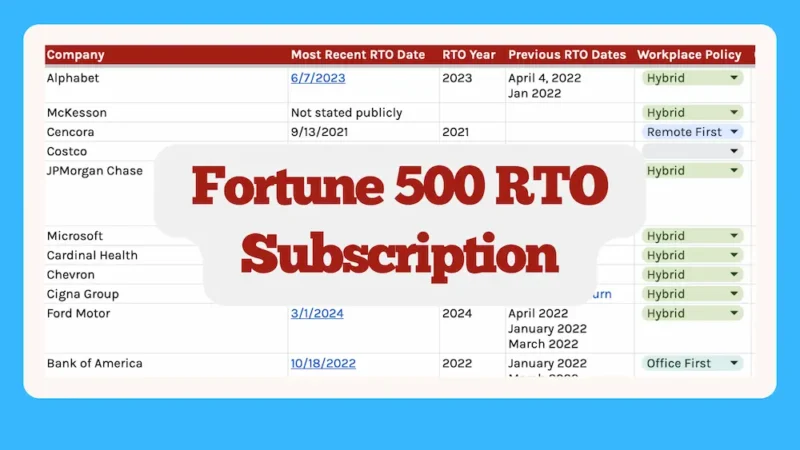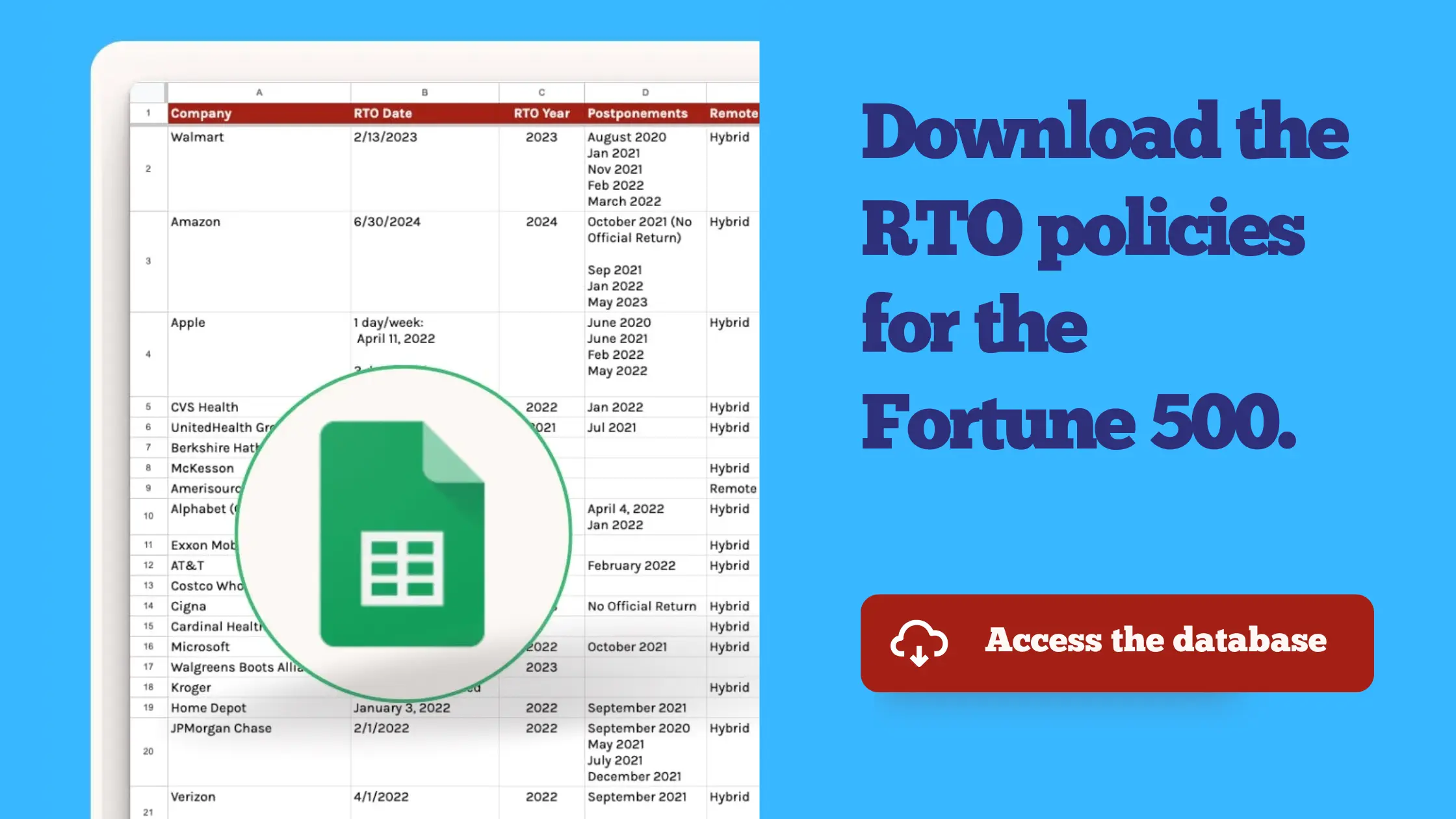Google Tells Remote Workers: Go Hybrid Or Leave

Alphabet (Google) first returned to the office on April 4, 2022 with a voluntary policy to work in a hybrid fashion for three days per week. Until an internal memo on June 7, 2023, Google had a positive stance toward remote work, stating that it expects 20% of its workforce to take advantage of the opportunity to work remotely full time, and that 85% of requests to work remotely had been approved as of August 2021.
On June 7, 2023, Google leadership changed its tune: “The company updated its hybrid work policy Wednesday and it includes tracking office badge attendance, confronting workers who aren’t coming in when they’re supposed to and including the attendance in employees’ performance reviews, according to internal memos viewed by CNBC. Most employees are expected in physical offices at least three days a week.”
On April 23, 2025, Google demanded that some “remote employees return to the office if they wanted to keep their jobs” and avoid being part of broader cost cuts at the company.
Here is everything you need to know about Google’s return to office plan and timeline.
Alphabet’s (Google’s) Return To Office: Current Policy
- Return To Office Date: April 23, 2025
- June 7, 2023: New measures to enforce the policy from 2022 (three days per week)
- April 4, 2022: Voluntary 3-days/week recommendation
- Location Policy: Hybrid
- Office Visit Expectations: Three days per week
- Office Space Footprint: Decreasing
Google’s RTO Timeline
July 6, 2020: Delayed indefinitely
“The idea is to rotate employees in for a day every few weeks to keep facilities at only around 10% occupancy.”
September 1, 2021: Delayed August 31, 2021
“In December, Google delayed return to offices to Sept. 1, after which employees would be required to work in person for at least three days a week.”
October 18, 2021: Delayed July 28, 2021
“We are extending our global voluntary work-from-home policy through October 18. We are excited that we’ve started to re-open our campuses and encourage Googlers who feel safe coming to sites that have already opened to continue doing so” (source).
January 10, 2022: Delayed December 1, 2021
“Beyond January 10, we will enable countries and locations to make determinations on when to end voluntary work-from-home based on local conditions, which vary greatly across our offices. To make sure everyone has ample time to plan, you’ll have a 30-day heads-up before you’re expected back in the office” (source).
April 4, 2022: Google’s real return-to-office date
In March of 2022, Alphabet announced employees should return to some of its office for three days per week starting on April 4, 2022.
June 7, 2023: Google cracks down on people not adhering to the policy from April of 2022
The company updated its hybrid work policy on Wednesday. The company will track office attendance through its touchless access system, confront workers who aren’t coming in when they’re supposed to, and include attendance in employees’ performance reviews, according to internal memos viewed by CNBC. Most employees are expected in the office at least three days a week.
April 23, 2025: Google threatens remote workers to come into the office or lose their jobs
Google demanded that some “remote employees return to the office if they wanted to keep their jobs” and avoid being part of broader cost cuts at the company.
CNBC obtained more details about the specific plans for multiple business units:
-
Google Technical Services: Remote employees are required to switch to a hybrid schedule or take a voluntary exit package. A one-time paid relocation is offered for those willing to move within 50 miles of an office.
-
People Operations (HR): Remote workers within 50 miles of an office must return to a hybrid schedule by June or their roles will be eliminated. Those living farther away can stay remote, but must go hybrid for new roles. A voluntary exit program began in March 2025.
-
Platforms and Devices (Android, Chrome, Fitbit, Nest): Offered voluntary exits starting January 2025. Nearly two dozen teams have been cut. Hybrid schedules are encouraged; remote work was noted but not the main factor in layoffs. Leadership emphasized agility following a team merger under SVP Rick Osterloh.
-
AI Teams: Co-founder Sergey Brin pushed for all AI employees to be in the office every weekday, stating 60 hours per week is ideal for productivity. He emphasized urgency to compete in the accelerating AI race.
Sentiment From Google Leadership
Stance on hybrid work
Google said it expects most workers to come into the office three days a week and have two days of remote work (source).
Stance on remote work
- On August 3, 2021, Alphabet officially announced its new stance on remote work: “Alphabet Inc.’s Google approved 85% of employee requests to work remotely or relocate once its offices fully re-open, the company told staff Tuesday (source).
- Google says it expects 20% of its employees to eventually take advantage of its policy to work remotely full-time, so far a mere 5% have (source).
- Nearly 14,000 of the company’s 156,500 full-time employees around the world have transferred to a new location or moved to fully remote work (source).
- June 7, 2023: “Google’s chief people officer, Fiona Cicconi, wrote an email to employees at the end of the day on Wednesday, which included doubling down on office attendance, reasoning that ‘there’s just no substitute for coming together in person,” according to CNBC.
Stance on office space
- Since January 2020, Google’s parent company Alphabet has spent nearly $100M on expanding its U.S. commercial real estate portfolio, including a $28.5 million office it bought in Sunnyvale, CA. at the height of the pandemic (source)
- January 14, 2022: Alphabet announced in January it would spend $1 billion for a campus-like office setting in London (source)
View All Return To Office Plans For The Fortune 500
Every month, we update every Fortune 500 company’s return-to-office policy. You can download the Fortune 500 RTO spreadsheet below.
RTO news & sentiment by company: Alphabet (Google), Amazon, Apple, Bank Of America, Goldman Sachs, JP Morgan Chase, Meta (Facebook), Microsoft, Morgan Stanley, Wells Fargo |


